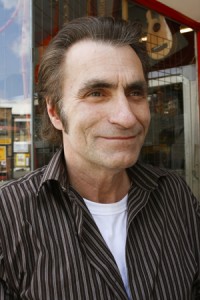On the Dalston terrace

Malvina Aragao, Chez Calabash
Dalston Lane is in flux. None who frequent it can have failed to notice the disruption caused by the construction of the Barratt Homes towers, to be named Dalston Square.
These have drawn comparisons with the high rises of Croydon, the destination of the new train line from Dalston Junction.
And other developments are being discussed: the Council is holding a consultation, scheduled to run until July 9, on the future of a derelict Georgian terrace on the street.
At a public event in the CLR James Library earlier this month (June), a Council planner said one option under consideration was the compulsory repurchase of these derelict properties back from the companies the council sold them to in 2001.
Many of the changes in Dalston have sparked controversy, and the debate over the future of the Georgian terrace shows the strength of feeling in the community.

John Wearn, Sound and Music
But how has the reality of Dalston’s regeneration affected business-people on Dalston Lane? And what are their hopes and fears for the future?
Malvina Aragão, who owns Chez Calabash at No 27a, said her business was suffering and that there had been fewer passers-by since the Barratt Homes building work began.
“Some days people don’t come to eat here and I make little money,” she said. “When the street was open, people came here a lot, but when the building works started people stopped passing by as much.”
Sound and Music, at No 66, was started over thirty years ago by brothers John and Mike Wearn. Asked what he thought of the changes happening in Dalston, John Wearn told the Citizen: “You won’t know until it is all finished – it might affect business; it might not.
“But we don’t know our future – that’s the point. We’ve been hard done by, by the Council.

Ron Foley, Business Hair Studio
We’re waiting for them to compulsory repurchase it [the derelict Georgian terrace] from the property developers it was sold to. Until we know where we stand, we don’t know our future.”
Ron Foley, owner of Business Hair Studio at No 7, said regeneration might bring mixed blessings.
He said: “If gentrification takes place in a radical way, it could mean a disproportionate amount of your existing clientele will move away because the area becomes too expensive for them.
“On the other hand, that’s only a pessimistic view; the positive side means that you could be looking at new business.”
He added: “With regards to the area generally, I think what’s going on is a good thing as I think the area does need some kind of change, albeit that if this is too radical then it could be fairly damaging to local architecture and the local environment…

Abdul Rakib, Ganges Tandoori
“Generally it is very important for planners to consider a lot more than just the price of property and the price of land; there are people involved, families involved, businesses involved.”
Abdul Rakib of the Ganges Tandoori restaurant at No 78 voices this sense of frustration: “Hopefully what’s happening [with the Dalston Square development] may give a different perspective to how customers see the area, but at the moment they’re focusing more on [the western end of Dalston Lane] rather than what’s happening here…
“They don’t really talk about the regeneration of where we are situated.”
Pepsi, owner of In Ting, a Caribbean café at No 80, said the temporary one-way system in place because of building works had caused inconvenience.
She said: “The one-way system is really messing things up, but so far my business is surviving.”

Pepsi Lara, In Ting Caribbean
